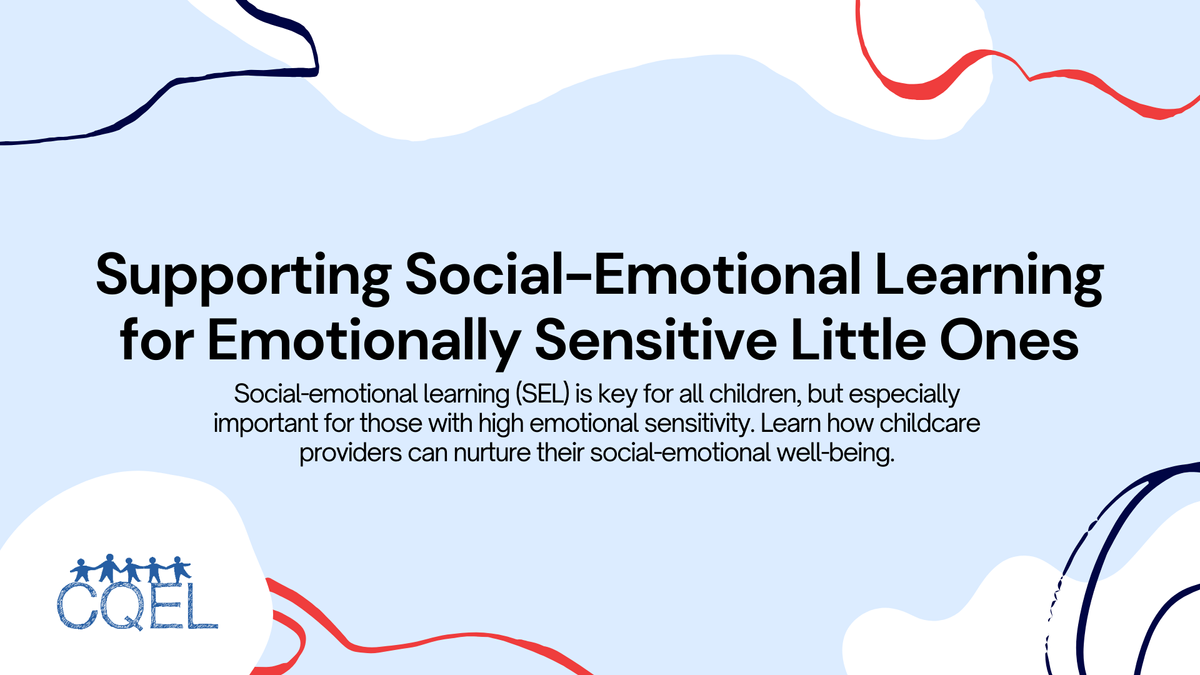Supporting Social-Emotional Learning for Emotionally Sensitive Little Ones
Social-emotional learning (SEL) is key for all children, but especially important for those with high emotional sensitivity. Learn how childcare providers can nurture their social-emotional well-being.

Social-emotional learning (SEL) is a critical aspect of early childhood development. It equips young children with the skills to recognize and manage their emotions, build healthy relationships, and make responsible decisions. In childcare settings across the country, fostering SEL becomes even more crucial as we encounter a growing number of emotionally sensitive children. These children, characterized by deep empathy and strong reactions to stimuli, may experience challenges navigating social situations and expressing their emotions effectively. By understanding their unique needs and implementing targeted strategies, childcare providers can play a pivotal role in nurturing their social-emotional well-being.
Emotionally sensitive children are not to be confused with those exhibiting behavioral disorders or developmental delays. They experience emotions intensely, cry more readily, and become easily overwhelmed by loud noises or large crowds. Imagine a toddler who crumples at the sound of a crying baby, or a preschooler who withdraws during boisterous group games. These are potential signs of emotional sensitivity, and recognizing them is the first step towards providing the necessary support.
Creating a supportive environment is the cornerstone of fostering SEL for emotionally sensitive children. Clear routines, predictable schedules, and consistent expectations offer a sense of security. Positive reinforcement strategies, like praise and stickers, acknowledge desired behaviors, motivating them to navigate challenges constructively. Visual aids and social stories can bridge the gap in understanding emotions and social cues. Imagine a visual chart depicting different emotions with corresponding facial expressions to help children identify their own feelings and those of others.
Building social-emotional skills requires a multifaceted approach. Teaching children about emotions using age-appropriate language and facial expressions allows them to identify feelings like happiness, sadness, or anger. Providing opportunities for expression through words, art, or dramatic play empowers them to communicate their inner world. Helping children manage strong emotions is equally important. Techniques like deep breathing exercises or calming music can promote self-regulation. Sensory tools like fidget spinners or play dough offer an outlet for pent-up energy. Most importantly, model coping mechanisms. Demonstrate how to take deep breaths when frustrated or walk away from a situation that feels overwhelming.
Social interaction and empathy are crucial aspects of SEL. Facilitating cooperative play activities encourages turn-taking, collaboration, and problem-solving skills. Role-playing scenarios provide a safe space to practice communication and conflict resolution. Story time becomes an opportunity to explore empathy through characters facing challenges and overcoming obstacles.
Building a strong partnership with parents is essential. Maintaining open communication allows you to understand each child's unique emotional needs and ensure consistency across environments. Share strategies used in your childcare setting so parents can reinforce them at home. Highligh local resources and support groups that cater to families with emotionally sensitive children.
Remember, childcare providers working with children experiencing trauma or displacement may require additional support. Seek out resources and professional development opportunities tailored to their specific needs.
Supporting social-emotional learning in emotionally sensitive children fosters empathy, resilience, and strong social skills. By implementing these strategies and continuously seeking knowledge, childcare providers can significantly impact the emotional well-being of young children. Remember, you are shaping not just individuals, but future generations of emotionally healthy citizens equipped to thrive in our diverse and ever-changing world.
Resources for Childcare Providers:
- National Association for the Education of Young Children (NAEYC): https://www.naeyc.org/
- The Center on the Developing Child at Harvard University: https://developingchild.harvard.edu/
- Zero to Three: https://www.zerotothree.org/
